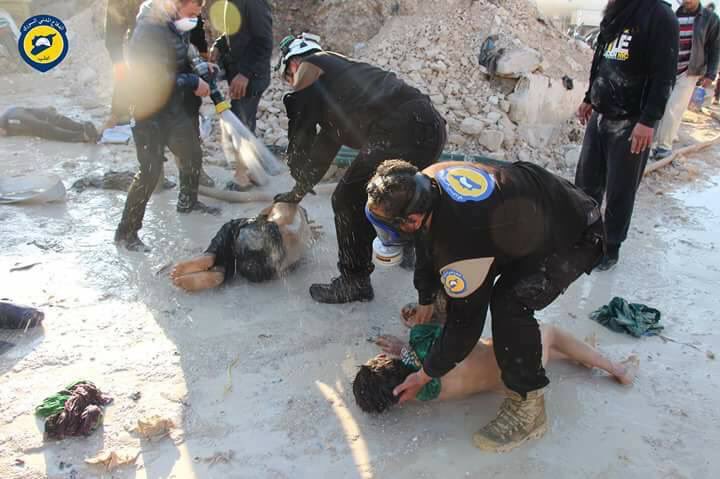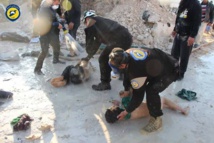Olivier Lepick, a French expert with decades of experience of chemical weapons, told AFP on Thursday that the theory advanced by the Russians was "completely fanciful".
"It would almost make you laugh if the situation was not so serious," said Lepick, a researcher at France's Foundation for Strategic Research (FRS).
"On a technical level, it doesn't stand up for a single moment," he added.
The expert said the way the agent was dispersed, according to witnesses in the northwestern town of Khan Sheikhun, was consistent with an phenomenon known as aerosolization.
Such an effect can only be caused by a military-grade chemical weapon and cannot be provoked by an accidental explosion, Lepick said.
"When you look at the areas of impact and the way people have been affected, you can see clearly that this is a munition that has been designed to deliver a chemical agent, in other words to produce an explosion, with a high degree of aerosolization," he said.
"In other words, it was the most effective way of dispersing the chemical agent."
If an airstrike had hit a warehouse where the toxic agent was being stored, it would have created a "toxic cloud", but the agent would not have been effectively dispersed into the air, he said.
"It was clearly a military chemical weapon that was used here. It was not a leak from a warehouse," he added.
- 'Russians protecting ally' -
Colonel Hamish de Bretton-Gordon, who was formerly head of the British army's Chemical, Biological, Radiological and Nuclear (CBRN) Regiment, said he had come to the same conclusion after speaking to doctors treating victims at the scene.
"The Russians are trying to protect their ally," he told BBC radio on Wednesday, the day after the attack.
"If you blow up a sarin (gas) depot, you destroy it. It is pretty clear that this is a sarin attack, a nerve agent.
"The view that it's an Al-Qaeda or rebel stockpile of sarin that's been blown up in an explosion is completely unsustainable and completely untrue."
Syria has denied claims that its army released the nerve agent and Foreign Minister Walid Muallem repeated the regime's denial on Thursday.
"The Syrian army has not, did not and will not use this kind of weapons -- not just against our own people, but even against the terrorists that attack our civilians with their mortar rounds," he said.
US President Donald Trump called the attack "an affront to humanity" and a US official said Thursday the Pentagon was preparing to present a range of possible military options in response.
However, Julien Legros, a researcher at France's national scientific research centre (CNRS) said he believed the Russian theory was not "out of the question".
He argued that it was theoretically possible that the contents of the toxic agent were stored in the same barrel and an explosion caused by an air strike could have caused a chemical reaction which turned the gas into a toxic gas.
A large part of the substance would have been destroyed in such a strike, "but if even 10 percent of it had become vapour, that 10 percent would have been deadly".
"If 10 milligrammes is enough to kill a person and you have 10 percent of a tonne, then you have more than enough to kill several hundred people," he said.
----------------------------------------------------------------------------------------------------------------------
"It would almost make you laugh if the situation was not so serious," said Lepick, a researcher at France's Foundation for Strategic Research (FRS).
"On a technical level, it doesn't stand up for a single moment," he added.
The expert said the way the agent was dispersed, according to witnesses in the northwestern town of Khan Sheikhun, was consistent with an phenomenon known as aerosolization.
Such an effect can only be caused by a military-grade chemical weapon and cannot be provoked by an accidental explosion, Lepick said.
"When you look at the areas of impact and the way people have been affected, you can see clearly that this is a munition that has been designed to deliver a chemical agent, in other words to produce an explosion, with a high degree of aerosolization," he said.
"In other words, it was the most effective way of dispersing the chemical agent."
If an airstrike had hit a warehouse where the toxic agent was being stored, it would have created a "toxic cloud", but the agent would not have been effectively dispersed into the air, he said.
"It was clearly a military chemical weapon that was used here. It was not a leak from a warehouse," he added.
- 'Russians protecting ally' -
Colonel Hamish de Bretton-Gordon, who was formerly head of the British army's Chemical, Biological, Radiological and Nuclear (CBRN) Regiment, said he had come to the same conclusion after speaking to doctors treating victims at the scene.
"The Russians are trying to protect their ally," he told BBC radio on Wednesday, the day after the attack.
"If you blow up a sarin (gas) depot, you destroy it. It is pretty clear that this is a sarin attack, a nerve agent.
"The view that it's an Al-Qaeda or rebel stockpile of sarin that's been blown up in an explosion is completely unsustainable and completely untrue."
Syria has denied claims that its army released the nerve agent and Foreign Minister Walid Muallem repeated the regime's denial on Thursday.
"The Syrian army has not, did not and will not use this kind of weapons -- not just against our own people, but even against the terrorists that attack our civilians with their mortar rounds," he said.
US President Donald Trump called the attack "an affront to humanity" and a US official said Thursday the Pentagon was preparing to present a range of possible military options in response.
However, Julien Legros, a researcher at France's national scientific research centre (CNRS) said he believed the Russian theory was not "out of the question".
He argued that it was theoretically possible that the contents of the toxic agent were stored in the same barrel and an explosion caused by an air strike could have caused a chemical reaction which turned the gas into a toxic gas.
A large part of the substance would have been destroyed in such a strike, "but if even 10 percent of it had become vapour, that 10 percent would have been deadly".
"If 10 milligrammes is enough to kill a person and you have 10 percent of a tonne, then you have more than enough to kill several hundred people," he said.
----------------------------------------------------------------------------------------------------------------------









 Home
Home Politics
Politics











